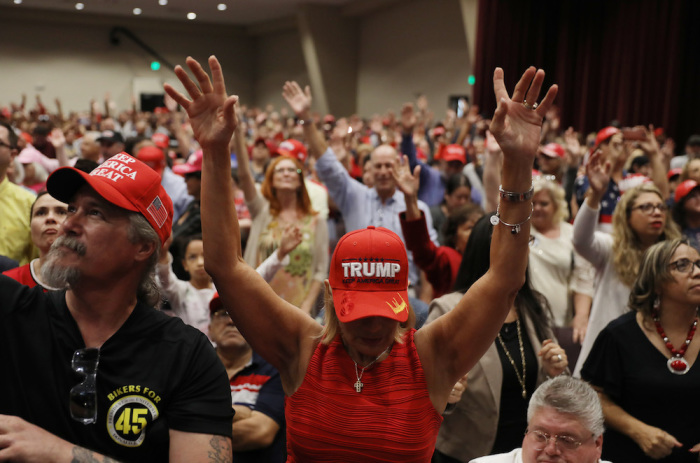White evangelicals disagree with most Americans on religion’s influence on gov't policies: poll

White evangelical Protestants hold views that are different from most other Americans when it comes to how much influence religion should have on government policies, according to a new poll that also shows white evangelicals are more supportive of the Trump administration's policies than other Christians and non-Christian groups.
The Associated Press and the NORC Center for Public Affairs Research at the University of Chicago released a survey this month that found white evangelical Protestants believe religion should have more influence on government policies than it currently does, while most other Americans believe religion should have less influence on public policy than it already has.
The survey includes responses from 1,053 adults polled between Dec. 5 and Dec. 9, 2019. The data carries a margin of error of 4.0 percentage points.
Eighty percent of white evangelicals surveyed said religion should have “a lot” or “some” influence when it comes to policies on abortion.
However, only 41 percent of all other Americans who took part in the survey agreed that religion should have at least some influence on abortion policy.
When asked whether religion has "a lot" or "some" influence on abortion policy in the U.S., non-evangelical Americans were more likely than white evangelicals (79 percent to 67 percent) to agree that religion already has an influence on abortion policies.
When it comes to LGBT policies, 62 percent of white evangelicals said religion should have “a lot” or “some” influence. Meanwhile, only 30 percent of other Americans said religion should have an influence on LGBT issues.
“White evangelical Protestants, who make up 14 percent of the population, are less likely than other groups to think religion has much influence on some government policies, particularly abortion and LGBT issues,” an issue brief reads. “However, they say that religion should have a greater influence over government policies than it currently does. In contrast, other Americans think religion should have less sway over many government policies.”
Although conservative white evangelicals are often criticized by the mainstream media for their views on abortion, same-sex marriage, sexuality, and the trans movement, the survey shows that white evangelicals also believe religion should carry a lot or some influence on other areas of public policy as well.
As for policies related to poverty, 76 percent of white evangelicals said religion should have “a lot” or “some” influence while only 48 percent of other Americans agreed. Sixty percent of white evangelicals said religion should have “a lot” or “some” influence on immigration policies. Thirty-two percent of other Americans said the same.
Sixty-nine percent of white evangelicals said religion should have “a lot” or “some” influence in education policy. Only 37 percent of other Americans agreed.
The only two categories where less than half of white evangelicals said religion should have “a lot” or “some” influence were “gun policy” and “climate change.”
Catholics and non-evangelical Protestants are also more likely than other Americans to believe that religion should have more influence on government policies. However, the survey shows that white evangelical Protestants hold more conservative views.
Sixty-seven percent of white evangelicals surveyed said they support making abortion “illegal except for in the cases of rape, incest or to save the life of the woman.” Only 37 percent of other Americans, 36 percent of other Protestants, and 45 percent of Catholics said the same.
Thirty-three percent of white evangelicals said they favor a policy to prohibit discrimination against the LGBT community. By comparison, 60 percent of other Protestants and 58 percent of Catholics favored such a policy.
White evangelicals were less likely than other Americans to say they favor “regulating carbon dioxide emissions,” “increasing taxes on wealthy Americans,” “reducing U.S. military intervention overseas” and “increasing assistance for poor Americans.” White evangelicals were also less likely to support a policy banning semi-automatic weapons.
White evangelicals (29 percent) were more likely than other Americans (17 percent) to favor “separating children from their parents at the border.” Fifty-four percent of white evangelicals said they oppose separating families at the border and 69 percent of other Americans said the same.
Heading into the 2020 election year, 79 percent of white evangelicals surveyed said they “approve” of the president’s job performance, indicating the religious demographic will continue to support Trump in heavy numbers.
Conservative Christians have favored the Trump administration’s actions on domestic and international issues relating to abortion, religious freedom and criminal justice reform as well as his appointment of conservative federal judges and two Supreme Court justices.
“White evangelical Protestants are President Trump’s strongest supporters,” the issue brief states.
Only 20 percent of white evangelicals said they “disapprove” of Trump’s job performance. Some evangelicals have voiced concern with Trump's behavior and his administration's policies on refugees and immigration.
Trump touted his administration's record on abortion and religious freedom at a Miami megachurch last Friday — a launch event for the "Evangelicals for Trump" coalition.
“I don’t think evangelicals are united on every position the president takes or says, but they do recognize he is the most pro-life-friendly president in modern history,” evangelical leader Franklin Graham told The Associated Press. “He has appointed conservative judges that will affect my children and grandchildren’s lives, long after he’s gone.”
About 34 percent of other Protestants and 45 percent of Catholics said they approved of Trump’s job performance and 66 percent of other Protestants and 55 percent of Catholics said they disapproved.
Additionally, 35 percent of respondents of other religions said they approved of Trump’s job performance and 65 percent said they disapproved.
Three-quarters of people with “no religion” said they disapproved of Trump’s job performance.
Follow Samuel Smith on Twitter: @IamSamSmith
or Facebook: SamuelSmithCP





























